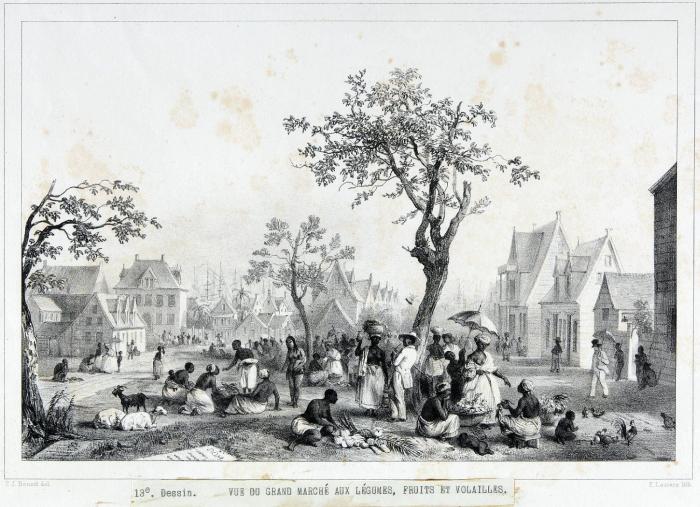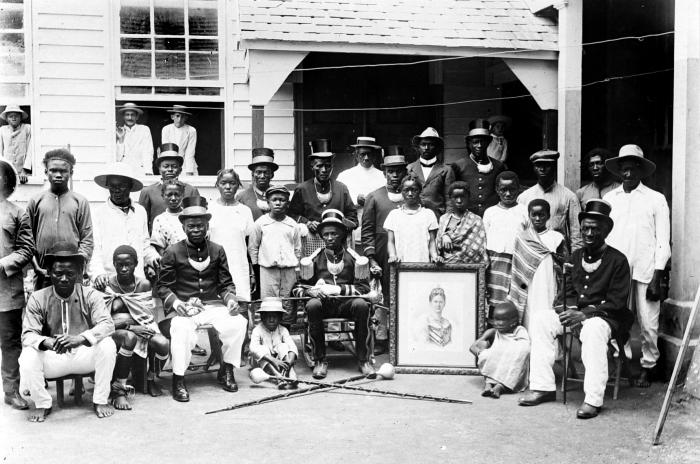|
Belfon Aboikoni
Belfon Aboikoni (31 January 1938 – 24 June 2014) was granman of the Saramaka maroons in Suriname. Aboikoni was sworn in as chief of the Saramaka, one of Suriname's Maroon peoples, in October 2005 at the age of 65. He succeeded the late chief Songo Aboikoni who died two years earlier. Belfon Aboikoni focused on land rights during his time as chief. Biography Aboikoni was born on 31 January 1938 in Dangogo. Aboikoni was well-disposed to the Netherlands and had portraits of Dutch Queens in his residence. His appointment as granman was accomplished by the government, which was contrary to the tradition of the Saramaka community. The appointment therefore led to disagreement and degenerated in March 2006 in his abduction for a few days by his own family members. Aboikoni remained in Paramaribo Paramaribo (; ; nicknamed Par'bo) is the capital and largest city of Suriname, located on the banks of the Suriname River in the Paramaribo District. Paramaribo has a population of roughl ... [...More Info...] [...Related Items...] OR: [Wikipedia] [Google] [Baidu] |
Granman
Granman (Ndyuka language: ''gaanman'') is the title of the paramount chief of a Maroon nation in Suriname and French Guiana. The Ndyuka, Saramaka, Matawai, Aluku, Paramaka and Kwinti nations all have a granman. The paramount chiefs of Amerindian peoples in Suriname are nowadays also often called ''granman''. The word comes from the Sranan Tongo language, a creole spoken in Suriname, and is derived from ''grand'' + ''man'' meaning "most important man." Granman was also used for the governors of Suriname. The word can be used in combination with other words: ''granman-oso'' (big man house) is the Presidential Palace. Government The paramount chief of a tribe is the granman. Below the granman are the ''kabitens'' (captains) followed by the ''basiyas'' (aldermen). The ''stam lanti'' consists of all the ''kabitens'' and ''basiyas'' who meet at least once a year under the authority of the granman and decide the policy for the entire tribe. A village has a ''lo lanti'' (council ... [...More Info...] [...Related Items...] OR: [Wikipedia] [Google] [Baidu] |
Saramaka
The Saramaka, Saamaka or Saramacca are one of six Maroon peoples (formerly called "Bush Negroes") in the Republic of Suriname and one of the Maroon peoples in French Guiana. In 2007, the Saramaka won a ruling by the Inter-American Court for Human Rights supporting their land rights in Suriname for lands they have historically occupied, over national government claims. It was a landmark decision for indigenous peoples in the world. They have received compensation for damages and control this fund for their own development goals. The word "Maroon" comes from the Spanish ''cimarrón'', which was derived from an Arawakan root. Since 1990 especially, some of the Saramaka have migrated to French Guiana due to extended civil war in Suriname. By the early 16th century, the term "maroon" (''cimarron'') was used throughout the Americas to designate slaves who had escaped from slavery and set up independent communities beyond colonists' control. Together with five other Maroon tribes i ... [...More Info...] [...Related Items...] OR: [Wikipedia] [Google] [Baidu] |
Boven Suriname
Boven Suriname (also Upper Suriname) is a resort in Suriname, located in the Sipaliwini District. Its population at the 2012 census was 17,954. Almost its entire population consists of Maroons The resort is home to many small tribal villages. The main village is Pokigron. Pokigron is located at the end of a paved road via Brownsweg to the Afobakaweg, Villages to the south of Pokigron can only be accessed by boat. The settlements on the right bank of the Upper Suriname River are usually adherents to the Winti (Afro-Surinamese) religion, while the left bank is mainly Christian. Aurora can also be accessed from the Laduani Airstrip. Botopasi, Djumu, Goddo, and Pikin Slee are served by the Botopasi Airstrip. Kajana is served by the Cayana Airstrip. Even though Boven Suriname had long been settled by the Maroons, it wasn't until 1908 when an expedition led by Johan Eilerts de Haan set out to find the source of the Suriname River. Villages * Abenaston * Asidonhopo * Aurora * Bot ... [...More Info...] [...Related Items...] OR: [Wikipedia] [Google] [Baidu] |
Surinam (Dutch Colony)
Surinam ( nl, Suriname), also unofficially known as Dutch Guiana, was a Dutch plantation colony in the Guianas, bordered by the equally Dutch colony of Berbice to the west, and the French colony of Cayenne to the east. It later bordered British Guiana from 1831 to 1966. History The colonization of Suriname Surinam was a Dutch colony from 26 February 1667, when Dutch forces captured Francis Willoughby's English colony during the Second Anglo-Dutch War, until 15 December 1954, when Surinam became a constituent country of the Kingdom of the Netherlands. The status quo of Dutch sovereignty over Surinam, and English sovereignty over New Netherland, which it had conquered in 1664, was kept in the Treaty of Breda of 31 July 1667, and again confirmed in the Treaty of Westminster of 1674. After the other Dutch colonies in the Guianas, i.e., Berbice, Essequibo, Demerara, and Pomeroon, were lost to the British in 1814, the remaining colony of Surinam was often referred to a ... [...More Info...] [...Related Items...] OR: [Wikipedia] [Google] [Baidu] |
Paramaribo
Paramaribo (; ; nicknamed Par'bo) is the capital and largest city of Suriname, located on the banks of the Suriname River in the Paramaribo District. Paramaribo has a population of roughly 241,000 people (2012 census), almost half of Suriname's population. The historic inner city of Paramaribo has been a UNESCO World Heritage Site since 2002. Name The city is named for the Paramaribo tribe living at the mouth of the Suriname River; the name is from Tupi–Guarani ''para'' "large river" + ''maribo'' "inhabitants". History The name Paramaribo is probably a corruption of the name of an Indian village, spelled Parmurbo in the earliest Dutch sources. This was the location of the first Dutch settlement, a trading post established by Nicolaes Baliestel and Dirck Claeszoon van Sanen in 1613. English and French traders also tried to establish settlements in Suriname, including a French post established in 1644 near present-day Paramaribo. All earlier settlements were abandone ... [...More Info...] [...Related Items...] OR: [Wikipedia] [Google] [Baidu] |
Granman
Granman (Ndyuka language: ''gaanman'') is the title of the paramount chief of a Maroon nation in Suriname and French Guiana. The Ndyuka, Saramaka, Matawai, Aluku, Paramaka and Kwinti nations all have a granman. The paramount chiefs of Amerindian peoples in Suriname are nowadays also often called ''granman''. The word comes from the Sranan Tongo language, a creole spoken in Suriname, and is derived from ''grand'' + ''man'' meaning "most important man." Granman was also used for the governors of Suriname. The word can be used in combination with other words: ''granman-oso'' (big man house) is the Presidential Palace. Government The paramount chief of a tribe is the granman. Below the granman are the ''kabitens'' (captains) followed by the ''basiyas'' (aldermen). The ''stam lanti'' consists of all the ''kabitens'' and ''basiyas'' who meet at least once a year under the authority of the granman and decide the policy for the entire tribe. A village has a ''lo lanti'' (council ... [...More Info...] [...Related Items...] OR: [Wikipedia] [Google] [Baidu] |
Suriname
Suriname (; srn, Sranankondre or ), officially the Republic of Suriname ( nl, Republiek Suriname , srn, Ripolik fu Sranan), is a country on the northeastern Atlantic coast of South America. It is bordered by the Atlantic Ocean to the north, French Guiana to the east, Guyana to the west, and Brazil to the south. At just under , it is the smallest sovereign state in South America. It has a population of approximately , dominated by descendants from the slaves and labourers brought in from Africa and Asia by the Dutch Empire and Republic. Most of the people live by the country's (north) coast, in and around its capital and largest city, Paramaribo. It is also one of the least densely populated countries on Earth. Situated slightly north of the equator, Suriname is a tropical country dominated by rainforests. Its extensive tree cover is vital to the country's efforts to mitigate climate change and maintain carbon negativity. A developing country with a relativel ... [...More Info...] [...Related Items...] OR: [Wikipedia] [Google] [Baidu] |
Songo Aboikoni
Songo may refer to: * Songo music, a type of contemporary Cuban music originating in Havana * Songo people, of northern Angola * Songo-salsa, a style of music that blends Spanish rapping and hip hop beats with salsa music and songo * Songo.mn, an on-demand delivery service in Mongolia. Places * Songo, Angola, a town and municipality in Uíge Province in Angola * Songo, Mozambique, a town next to the Cahora Bassa lake in Tete Province in central Mozambique * Songo, Burkina Faso, a town in the Zabré Department of Boulgou Province in south-eastern Burkina Faso * Songo-Doubacore, a commune in the Cercle of Koutiala in the Sikasso Region of southern Mali * Songo – La Maya, a municipality in Santiago de Cuba Province, Cuba * Songo Mnara Songo Mnara is a historic Swahiili settlement in located on Songo Mnara Island in Pande Mikoma, Kilwa District in Lindi Region of Tanzania. The island is home to a Medieval Swahili stone town. The stone town was occupied from the 14th t ... [...More Info...] [...Related Items...] OR: [Wikipedia] [Google] [Baidu] |
1938 Births
Events January * January 1 ** The new constitution of Estonia enters into force, which many consider to be the ending of the Era of Silence and the authoritarian regime. ** State-owned railway networks are created by merger, in France (SNCF) and the Netherlands (Nederlandse Spoorwegen – NS). * January 20 – King Farouk of Egypt marries Safinaz Zulficar, who becomes Queen Farida, in Cairo. * January 27 – The Honeymoon Bridge at Niagara Falls, New York, collapses as a result of an ice jam. February * February 4 ** Adolf Hitler abolishes the War Ministry and creates the Oberkommando der Wehrmacht (High Command of the Armed Forces), giving him direct control of the German military. In addition, he dismisses political and military leaders considered unsympathetic to his philosophy or policies. General Werner von Fritsch is forced to resign as Commander of Chief of the German Army following accusations of homosexuality, and replaced by General Walther von ... [...More Info...] [...Related Items...] OR: [Wikipedia] [Google] [Baidu] |
2014 Deaths
This is a list of deaths of notable people, organised by year. New deaths articles are added to their respective month (e.g., Deaths in ) and then linked here. 2022 2021 2020 2019 2018 2017 2016 2015 2014 2013 2012 2011 2010 2009 2008 2007 2006 2005 2004 2003 2002 2001 2000 1999 1998 1997 1996 1995 1994 1993 1992 1991 1990 1989 1988 1987 See also * Lists of deaths by day * Deaths by year {{DEFAULTSORT:deaths by year ... [...More Info...] [...Related Items...] OR: [Wikipedia] [Google] [Baidu] |

.jpg)



